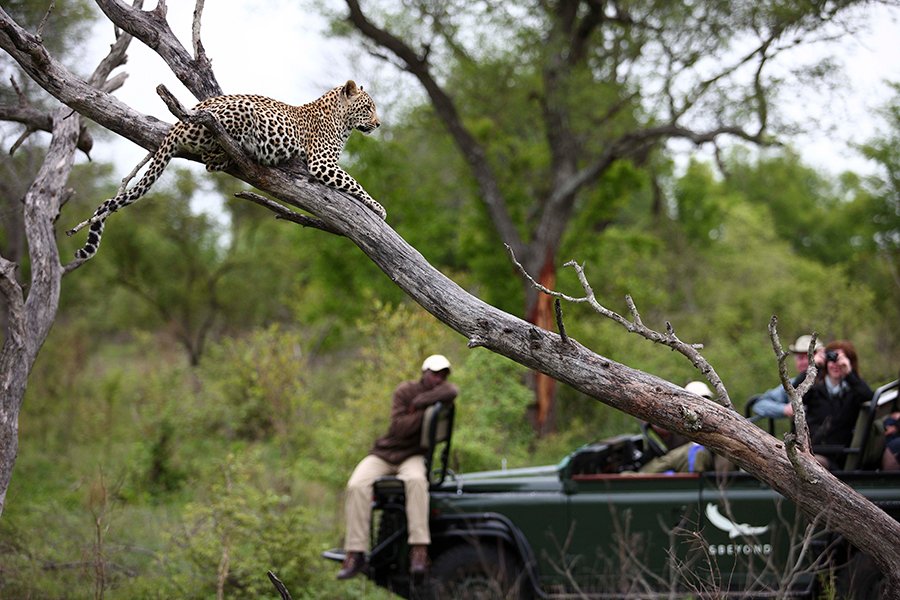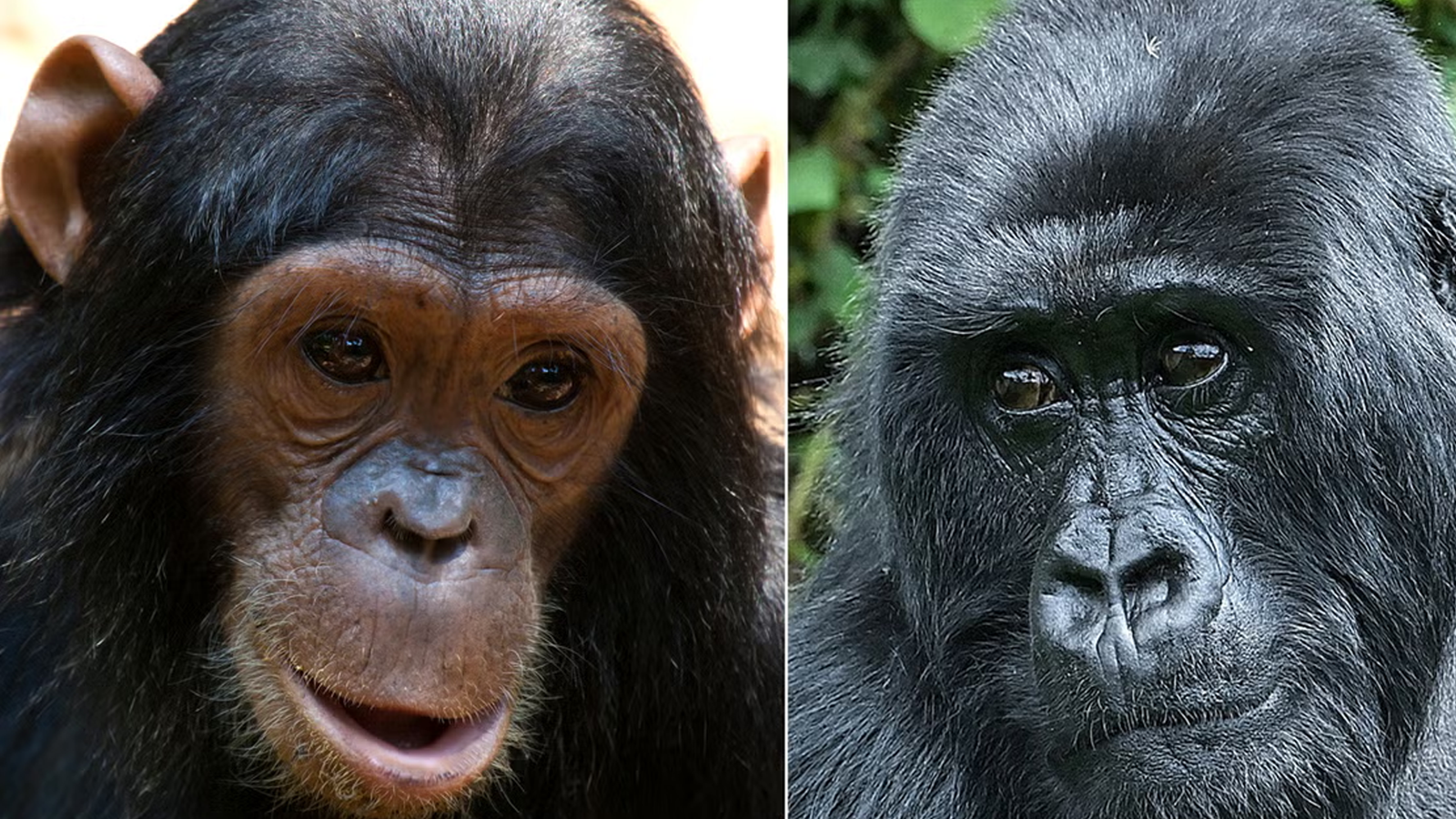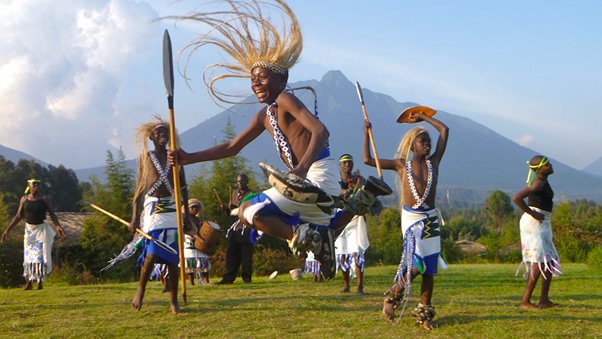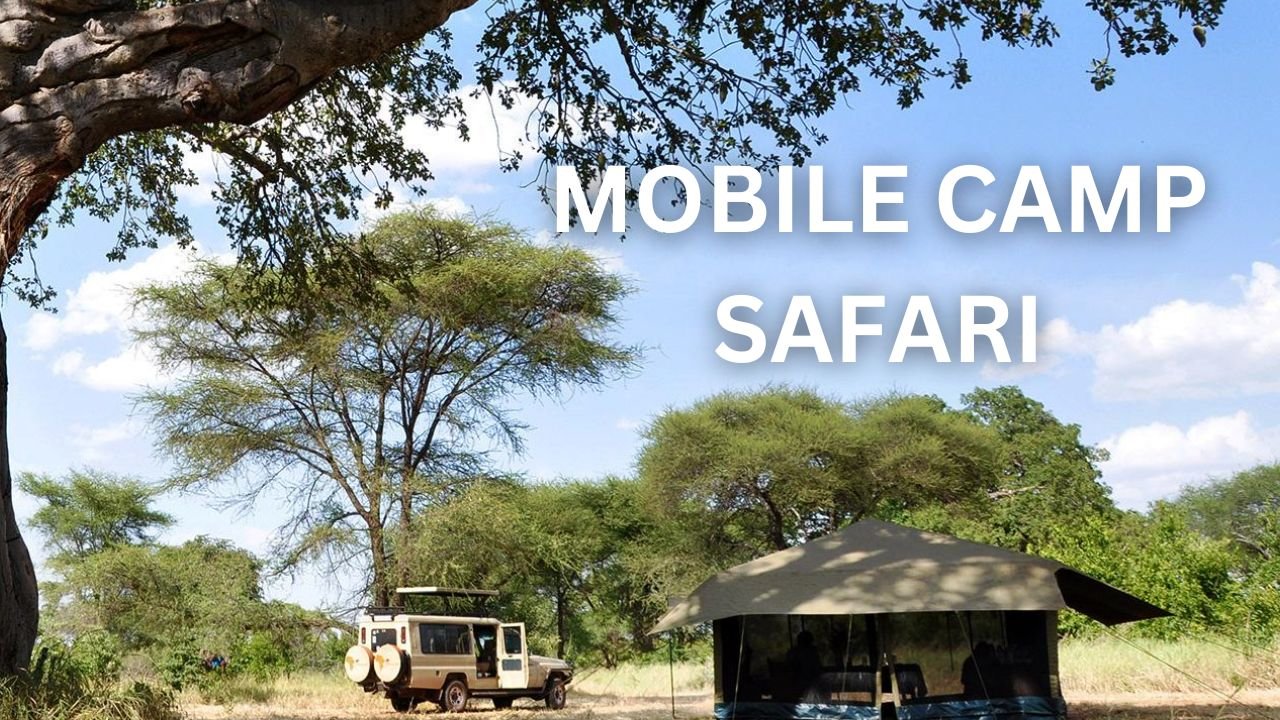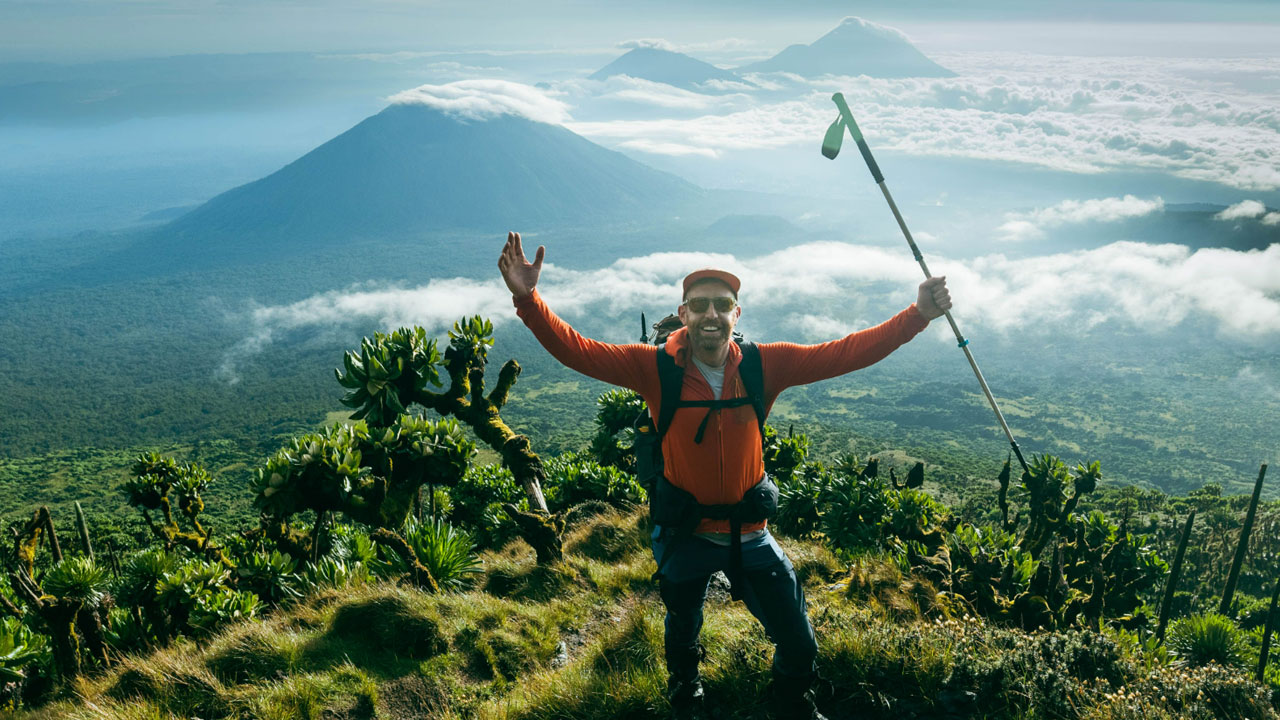 If you are considering a visit to Rwanda for the first time, you are in the right place. Drawing on our extensive experience of traveling through Rwanda and creating customized itineraries for thousands of visitors since 1998, we have crafted this comprehensive Rwanda travel guide.
If you are considering a visit to Rwanda for the first time, you are in the right place. Drawing on our extensive experience of traveling through Rwanda and creating customized itineraries for thousands of visitors since 1998, we have crafted this comprehensive Rwanda travel guide.
Where is Rwanda?
The Republic of Rwanda is a landlocked nation situated in Central Africa’s Great Rift Valley, where the Lakes region of Africa intersects with Southeast Africa. Bordered by Uganda, Tanzania, Burundi, and the Democratic Republic of the Congo, Rwanda’s geography is characterized by mountains, savannas, and numerous lakes. Located few degrees south of the Equator, Rwanda’s quilt-like topography and high elevation it the nickname “land of a thousand hills.
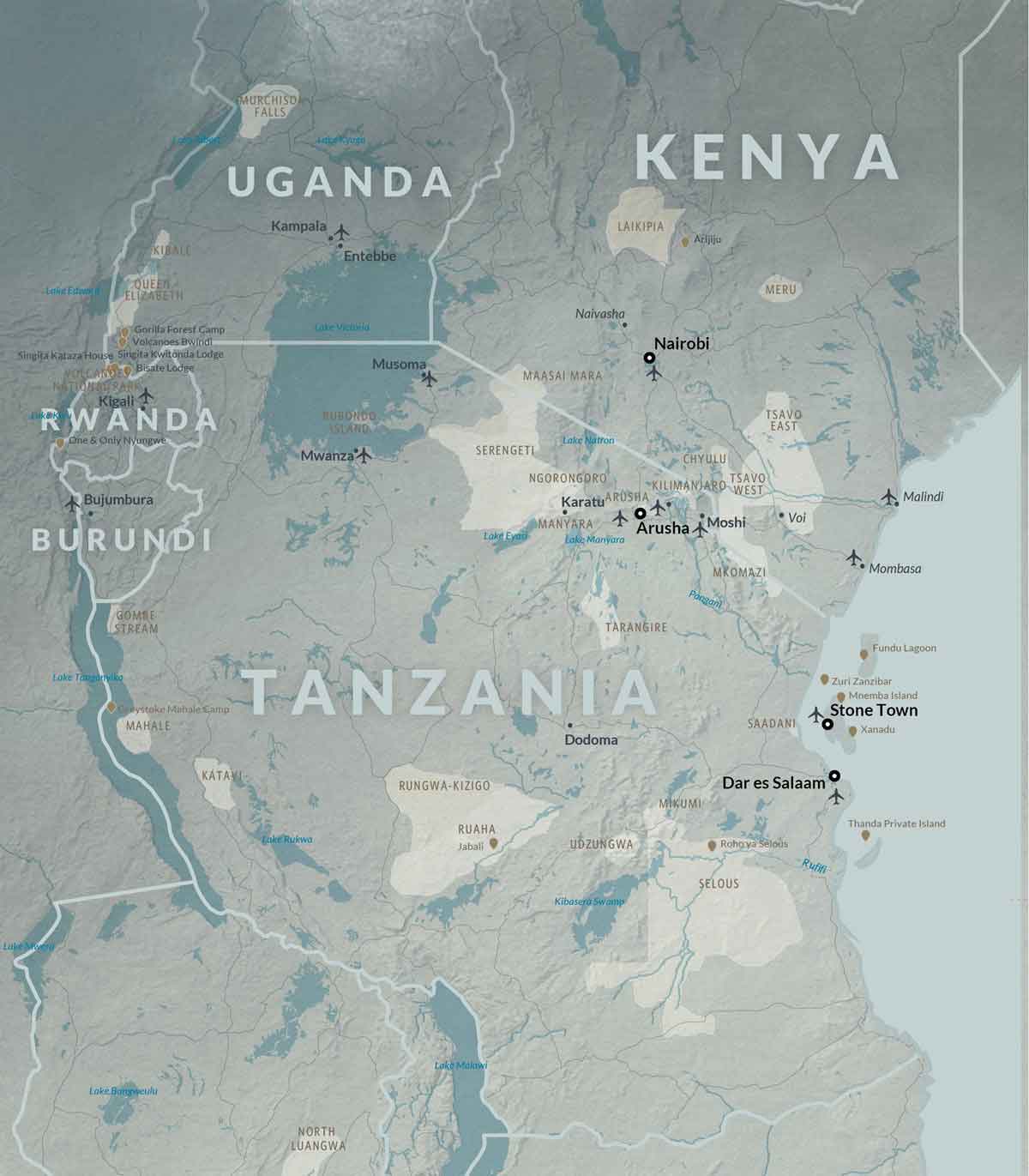
Why Go to Rwanda?
Africa’s Most Accessible Gorilla Trekking Destination
The greatest draw for visitors to Rwanda – and arguably one of the most profound wildlife encounters on the planet – is gorilla trekking in the country’s lush montane rainforests. Close-up interactions with the world’s last surviving mountain gorillas in Rwanda’s Volcanoes National Park create unforgettable memories for every visitor.
With fewer than 900 mountain gorillas remaining in the wild, trekking into their natural habitat is the only way to witness these critically endangered creatures, as they cannot survive in captivity.
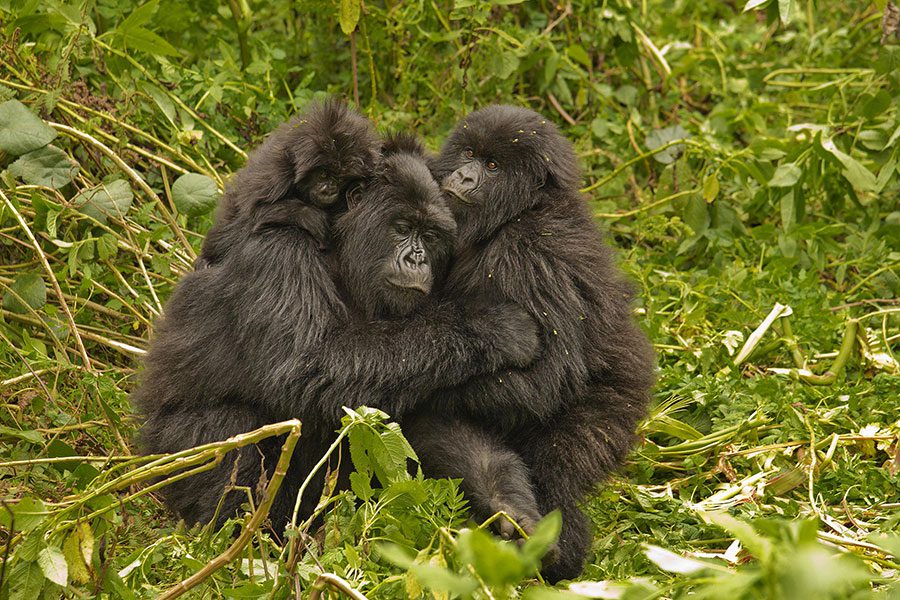
Rwanda stands as Africa’s most accessible destination for gorilla trekking. Volcanoes National Park is located a mere 80 kilometers (50 miles) from Kigali International Airport, making it an ideal choice for those with limited time.
Visitors can easily land in Kigali, travel to their lodge, enjoy a trekking experience the following day, and return to the airport the day after, allowing you to complete your gorilla trekking adventure in five days or less.
Track Chimpanzees & Other Primates
While gorilla trekking is one of the top attractions in Rwanda, the country also offers a variety of other primate experiences. Nyungwe Forest National Park, located in the southwest, is home to thirteen primate species, including chimpanzees and the Rwenzori colobus monkeys.

Nyungwe Forest is an expansive, untouched tropical rainforest that spans over 1,000 square kilometers (385 square miles) and boasts the largest remaining area of montane forest in East or Central Africa. This biodiverse haven is home to more than 310 bird species, over 75 mammal species, and hundreds of butterflies and orchids.
With its mist-covered hills filled with the calls of chimpanzees and birds, Nyungwe Forest is a quintessential tropical rainforest and a must-visit for wildlife enthusiasts.
See the Big 5
Although Rwanda may not be the first destination that comes to mind for a ‘classic’ safari, it offers a fantastic opportunity to combine gorilla trekking with a safari experience in Akagera National Park. The park’s savannah plains, lakes, papyrus swamps, and rolling hills make it one of Africa’s most scenic safari locations.
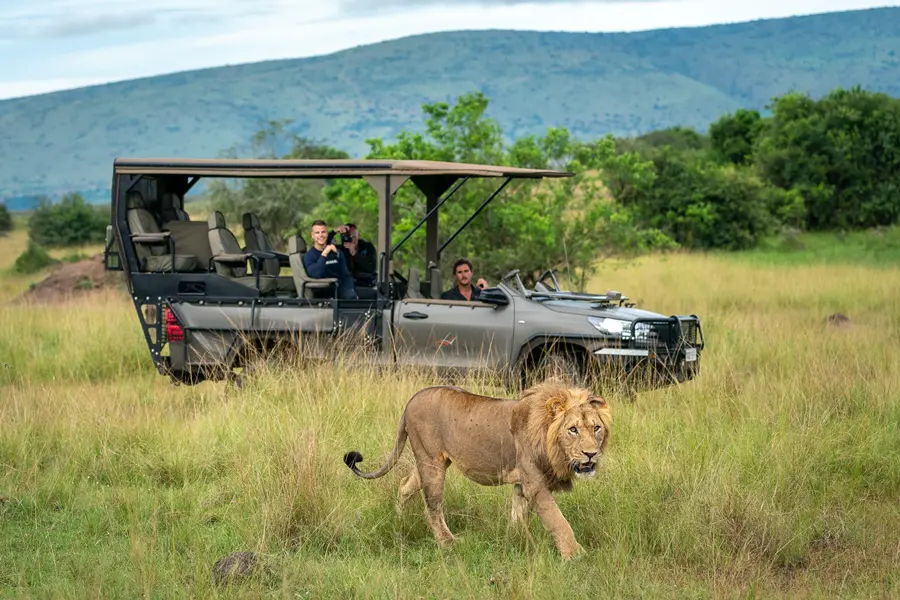
Akagera is home to the largest protected wetlands in Central Africa and a healthy population of around 8,000 animals. In recent years, successful reintroduction programs saw lions released into the park in 2015, followed by Eastern black rhinos in 2017. These programs have made Akagera a celebrated Big 5 destination once again.
Managed in partnership with African Parks, a non-governmental conservation organization, Akagera National Park has seen positive changes, and its efforts are helping to ensure the sustainability of the park’s rich biodiversity.
Explore One of Africa’s Cleanest & Most Inspiring Cities
The capital city of Rwanda, Kigali, stands out as a symbol of progress and cleanliness on the African continent. Rwanda is leading the charge in creating a single-use plastic-free Africa, having instituted a national ban on non-biodegradable plastic bags in 2008.
Furthermore, the country introduced Umuganda, a universal community service initiative that takes place on the last Saturday morning of each month. During this time, citizens come together to clean the streets, tend to gardens, and help their neighbors, fostering a spirit of unity and civic responsibility.
When visiting Rwanda, you’re likely to spend a night or two in Kigali, and you’ll be greeted by a modern, impeccably clean city. Spanning across numerous hills, ridges, and valleys, Kigali offers breathtaking views and a dynamic cultural scene.
The city is known for its vibrant restaurant and nightlife offerings, with a wide selection of shopping malls, chic boutiques, and charming coffee shops. For a more authentic experience, be sure to visit one of Kigali’s bustling markets, where you can interact with locals and purchase unique handmade crafts.
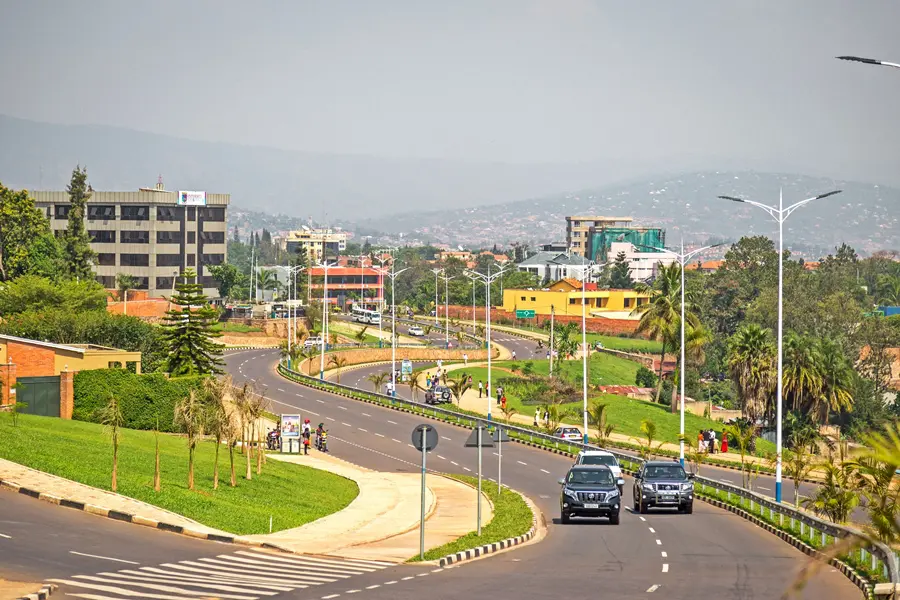
Kigali is also home to several notable landmarks. The State House Museum and the Natural History Museum provide fascinating insights into Rwanda’s history and culture. However, one of the most powerful and well-known attractions in the city is the Kigali Genocide Memorial.
This poignant monument offers visitors a moving and comprehensive account of the events leading up to the 1994 genocide, its devastating impact, and how far Rwanda has come since. It serves as a powerful reminder of resilience, peace, and the transformative journey the country has undertaken.
Where to Go in Rwanda
Volcanoes National Park
One of Rwanda’s most iconic destinations, Volcanoes National Park is the country’s crown jewel, offering an unparalleled wildlife experience. Spanning 160 square kilometers (62 square miles), the park is home to five of the eight volcanoes in the Virunga Mountain range and serves as the backdrop for life-changing gorilla trekking adventures.
For many, the chance to spend time with mountain gorillas in their natural habitat is a once-in-a-lifetime experience that simply cannot be matched by any other wildlife encounter on Earth.
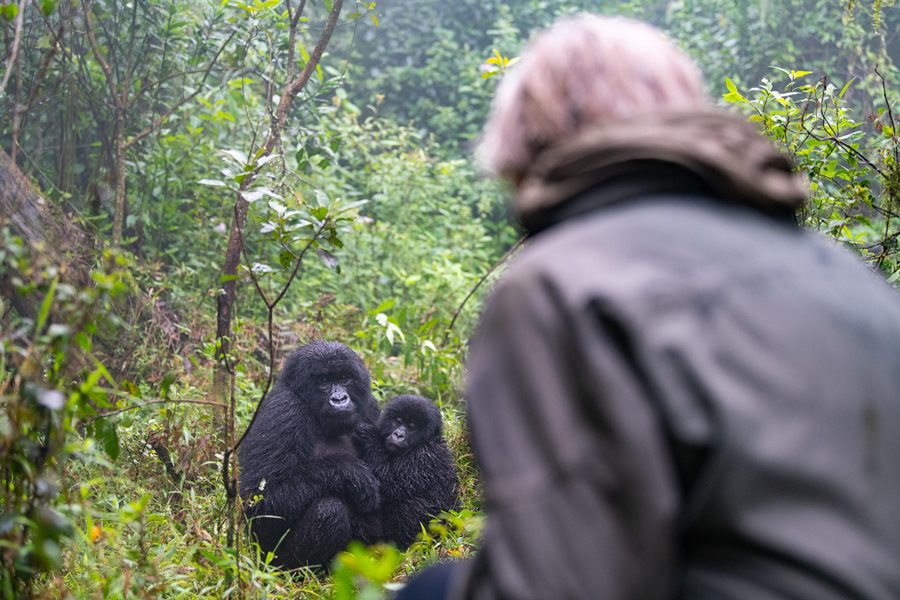
Guided by skilled gorilla trackers, visitors navigate through Volcanoes’ lush landscape, where towering African redwoods, bamboo groves, winding vines, and colorful flowering lobelias create a breathtaking environment for trekking. This park also holds historical significance as it was once the base of pioneering primatologist Dian Fossey.
A visit to Fossey’s grave provides an opportunity to honor her legacy, while immersive experiences with the Dian Fossey Gorilla Fund offer visitors a deeper understanding of ongoing gorilla conservation efforts.
In addition to gorillas, Volcanoes National Park is home to a diverse array of wildlife, including monkeys, with the rare golden monkey among the most notable, and an abundance of forest birds. By visiting this incredible park, a portion of your travel spending supports community initiatives in surrounding areas, ensuring that the benefits of gorilla trekking extend far beyond the park itself.
This collaboration between tourism and conservation ensures that gorilla conservation remains not only sustainable but also deeply embedded in the well-being of rural communities in the region.
Nyungwe Forest National Park
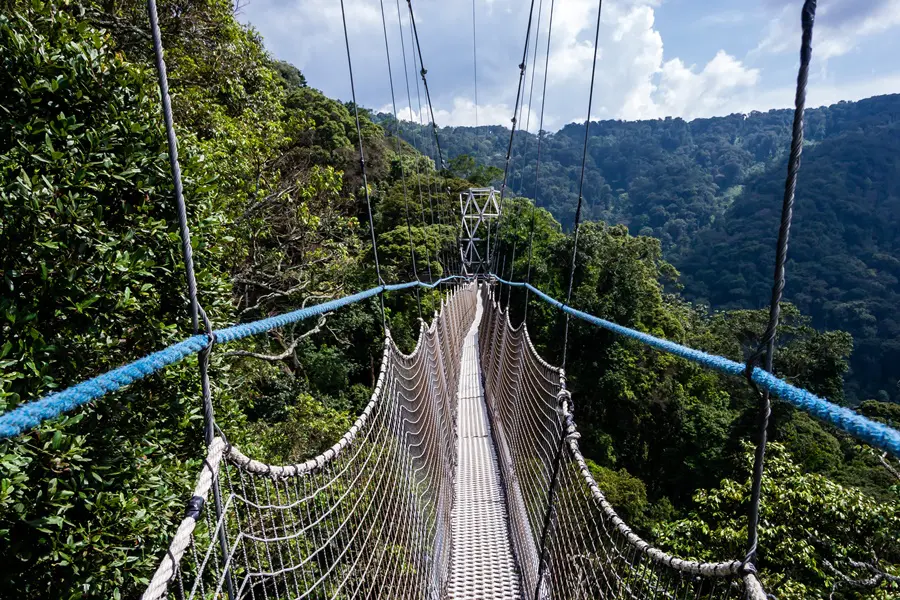
Nyungwe Forest National Park is a sprawling tropical rainforest that holds the title of the largest remaining strip of montane forest in Central and East Africa. This biodiverse paradise is home to a stunning variety of bird, butterfly, and orchid species, as well as roughly a quarter of Africa’s primates.
The heart of Nyungwe is truly magical—towering ancient mahogany and ebony trees, vibrant orchids clinging to every branch, and a kaleidoscope of colorful birds and butterflies fluttering in the air. As you walk through the forest, the calls of the diverse primates guide your way, adding a sense of wonder to every step.
Primate safaris are one of the premier Rwanda tourist attractions, and Nyungwe is the perfect destination for those seeking these adventures. With 13 different primate species, including chimpanzees, Rwenzori colobus monkeys, l’Hoest’s monkeys, and the grey-cheeked mangabey, trekking through this enchanting rainforest offers countless unforgettable encounters.
Best Things to Do
Nyungwe Forest National Park features over 130 kilometers (80 miles) of hiking trails, providing visitors with numerous opportunities to explore the forest’s magical interiors. Walking in Nyungwe is an experience unlike any other.
One of the park’s most unique features is the Igishigishigi Trail, which includes East Africa’s highest canopy walk. This metal bridge, suspended 50 meters (164 feet) above the forest floor, offers visitors an exhilarating bird’s-eye view of Nyungwe’s vast rainforest. Not for the faint-hearted, the canopy walk gives you an unparalleled sense of the sheer scale and beauty of this ancient forest.
Akagera National Park
Covering about 1,120 square kilometers (432 square miles), Akagera National Park is one of Africa’s oldest protected areas, first established in 1934. In the late 1990s, the park suffered significant damage from poaching and cattle grazing, resulting from Rwanda’s civil war. However, under the management of African Parks, a non-governmental conservation organization, Akagera has undergone a remarkable transformation.
Through various anti-poaching initiatives and the reintroduction of lions and rhinos, Akagera has seen its animal populations flourish, with its ecosystems slowly returning to their former glory. Today, Akagera is a conservation success story and one of Rwanda’s most beautiful and diverse safari destinations.
The park’s landscape is a patchwork of low-lying grasslands, savannah plains, rolling hills, valleys, and a series of lakes, marshes, and papyrus swamps—collectively forming the largest protected wetlands in central and eastern Africa. This rich diversity of habitats makes Akagera an incredibly scenic park and a must-visit for nature lovers.
On a safari in Akagera, you can expect to encounter plains species such as impala, topi, eland, giraffe, waterbuck, sable, roan, and zebra. Hippos, crocodiles, buffalo, and elephants are also commonly spotted on game drives. Thanks to successful reintroduction programs, Akagera is now home to the Big 5, including lions and rhinos. Leopards, although present, can be a little trickier to spot due to their mastery of camouflage and stealth.
A Birdwatcher’s Paradise
Akagera is a dream destination for birdwatchers. With over 480 bird species recorded, the park is a haven for birding enthusiasts. Raptors and savannah birds are abundant, along with numerous endemic species like the red-faced barbet.
The park’s lakes are teeming with waterbirds, including African fish eagles, open-billed storks, cormorants, herons, and crowned cranes. For the lucky few, a sighting of the rare and prehistoric-looking shoebill, or “whalehead,” is a once-in-a-lifetime experience.
Kigali: A Modern & Uplifting Capital
Kigali, the capital city of Rwanda, serves as the primary entry and exit point for gorilla trekking safaris. When visiting Rwanda, most travelers fly into Kigali International Airport and either transfer directly to Volcanoes National Park (about 80 kilometers or 50 miles away) or spend a night in Kigali itself.
While many tourists use Kigali as a brief stopover before or after their gorilla trekking adventure, the city is a wonderful destination in its own right. If you have extra time, exploring Kigali offers a unique opportunity to interact with its warm and welcoming locals and gain an insightful look into Rwanda’s culture and progress.
One of the city’s most important attractions is the Kigali Genocide Memorial. Set amidst beautiful rose gardens and water fountains, the memorial offers a profound and moving narrative of the tragic events leading up to Rwanda’s 1994 genocide.
It helps visitors understand the reasons behind this devastating chapter in history while also honoring the remarkable healing and recovery Rwanda has experienced since then. For anyone visiting Rwanda for the first time, the Kigali Genocide Memorial is an essential and impactful stop that will leave a lasting impression.
Other museums worth visiting in Kigali include the State House Museum and the Natural History Museum. Kigali also boasts a wide range of contemporary shopping malls, a lively café and bar scene, authentic markets, and hotels of a good international standard.
Best Things to Do:
- Visit the Kigali Genocide Memorial
- Browse for souvenirs at the Caplaki Handicrafts Cooperative
- Explore the Kigali Cultural Village for live music and art workshops
- Sample delicious fair-trade coffee at the Hingakwa Women’s Coffee Cooperative
Lake Kivu: Africa’s Sixth Largest Lake
Lake Kivu, located on Rwanda’s western border, is one of Africa’s Great Rift Valley freshwater lakes and one of the country’s hidden gems. The real charm of the Lake Kivu region lies in the drive between the towns that line the lake. T
he winding roads twist through picturesque hills and mountains, offering stunning views of the lake below. This route provides a leisurely way to travel between Nyungwe Forest and Volcanoes National Parks while enjoying the serenity of Lake Kivu’s pristine beaches and warm, safe swimming waters.
Best Things to Do:
- Spend a couple of days in Gisenyi, a charming town on the northern edge of Lake Kivu. Once a popular colonial beach resort, Gisenyi features lakeside mansions, trendy bars perfect for sundowner cocktails, and a selection of international-standard hotels.
When to Go to Rwanda
The best time to visit Rwanda is between June and September, during the country’s dry season. This period offers the most comfortable climate for gorilla trekking in Volcanoes National Park, a safari in Akagera, and has the lowest risk of malaria.
While it is possible to trek to see mountain gorillas at other times of the year, bear in mind that the experience may be more challenging due to rainfall, as well as the steep and muddy paths that come with the wet season.
If you’re visiting Rwanda in January and February, the high-altitude regions like Kigali, Lake Kivu, Volcanoes, and Nyungwe are hot during the day but cool in the evenings. The lower-lying regions, such as Akagera National Park, remain hot during the day and warm in the evenings.
This is a great time to go on an Akagera safari and soak in Rwanda’s breathtaking scenery. It’s also a good period for gorilla trekking, although it can be a bit more humid compared to the June to September dry season.
Guidelines for the Best Time to Visit Rwanda
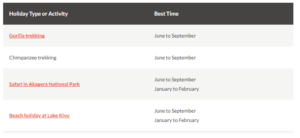
What It Will Cost to Visit Rwanda
It’s difficult to provide a single cost for a trip to Rwanda, as there are many factors to consider. These include the time of year you’re traveling, the duration of your stay, and whether you prefer comfortable or luxurious accommodation. Instead, they prefer to consult with each client individually, using their on-the-ground expertise to create a customized itinerary tailored to your preferences and budget.
However, if you’re looking for ballpark figures that may help with formulating a budget, here are some guidelines:

Know When You Want to Go
Timing is crucial when visiting Rwanda. Many of the country’s top attractions and experiences, such as gorilla trekking, depend on seasonal factors like rainfall. Having specific travel dates in mind will help shape your itinerary and make sure you visit during the best time for your preferred activities.Know Where You Want to Go
Start by setting a clear goal for your visit. Whether you’ve dreamed of seeing gorillas since childhood or wish to witness the Big 5 in the wild, identifying your must-see animals or experiences will help pinpoint your ideal destinations in Rwanda.Have a Budget Estimate
Traveling to Africa, especially for safaris, is often a significant investment. It’s helpful to have a budget range that you’re comfortable with and share it with your travel agent early on. This will expedite the consultation process, ensuring you receive an itinerary tailored to your preferences and budget. Knowing your budget upfront will make the planning of your first-time visit to Rwanda much smoother.Choose an Established Travel Agent
When planning your first trip to Rwanda, make sure to select a reliable travel agent. Look for these essential qualities:- Personal travel experience in Rwanda: The agent should have firsthand experience with the destination.
- Independent, unbiased advice: Ensure the agent is not tied to any specific lodge, safari activity operator, or marketing company.
- Financial protection: Choose an agent who offers the necessary insurance to protect your travel investment.
- Full travel booking service: A comprehensive agent can take care of every detail, from flights and activities to accommodation and transfers.
- 24/7 on-safari support: A credible agent will provide on-the-ground support during your safari.
- Recent reviews: Check independent review sites like Feefo for honest feedback from previous clients.
